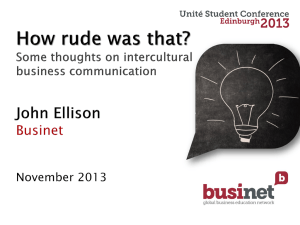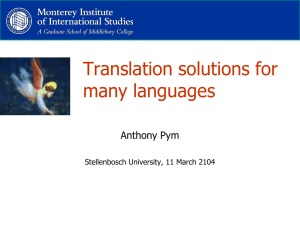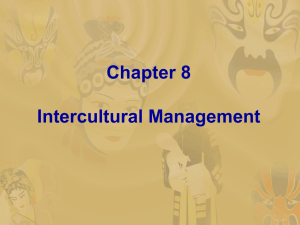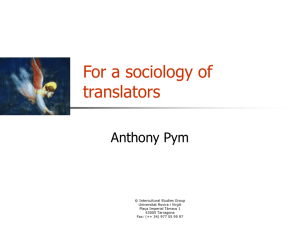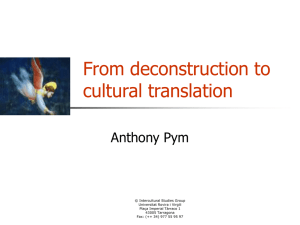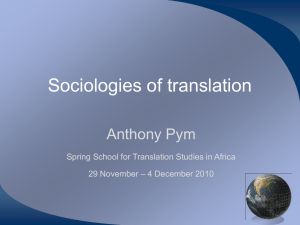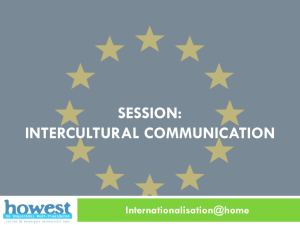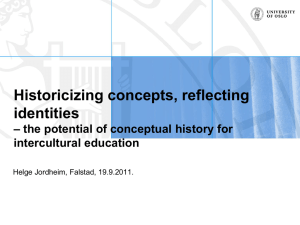cognition_technology..
advertisement
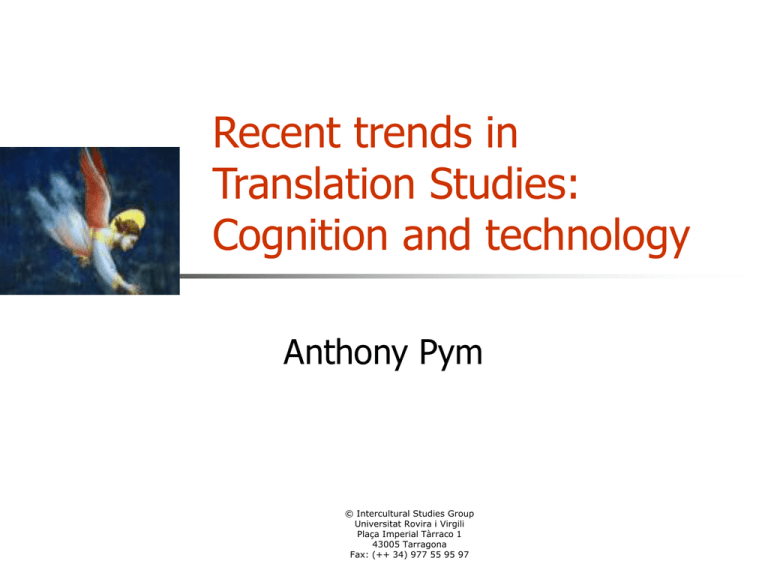
Recent trends in Translation Studies: Cognition and technology Anthony Pym © Intercultural Studies Group Universitat Rovira i Virgili Plaça Imperial Tàrraco 1 43005 Tarragona Fax: (++ 34) 977 55 95 97 Traditional positions… Equivalence (literal vs. free) Between texts (products) For an external purpose (Skopos) With translation-specific features (“universals”, from corpora): Simplification Explicitation Adaptation Equalizing Avoidance of TL unique terms © Intercultural Studies Group Problems with those positions There are shifts everywhere They concern more than literal vs. free Product analysis cannot say why they occur Product analysis cannot distinguish between the translation-specific features. New technologies make the features non-specific. © Intercultural Studies Group Problems with those positions There are shifts everywhere Product analysis cannot say why they occur Product analysis cannot distinguish between the translation-specific features. New technologies make the features non-specific. © Intercultural Studies Group Process studies use Think-Aloud Protocols (TAPs) Translog Screen recording Eye-tracking Post-performance interviews © Intercultural Studies Group Screen recording © Intercultural Studies Group TAPs © Intercultural Studies Group Translog © Intercultural Studies Group Eyetracking © Intercultural Studies Group More experienced translators… 1) use more paraphrase and less literalism as coping strategies (Kussmaul 1995, Lörscher 1991, Jensen 1999) © Intercultural Studies Group More experienced translators… 2) process larger translation units (Toury 1986, Lörscher 1991, Tirkkonen-Condit 1992) © Intercultural Studies Group More experienced translators… 3) spend longer reviewing their work at the postdrafting phase but make fewer changes when reviewing (Jensen and Jakobsen 2000, Jakobsen 2002, Englund Dimitrova 2005) © Intercultural Studies Group More experienced translators… 4) read texts faster and spend proportionally more time looking at the target text than at the source text (Jakobsen and Jensen 2008) © Intercultural Studies Group More experienced translators… 5) use top-down processing and refer more to the translation purpose (Fraser 1996; Jonasson 1998; Künzli 2001, 2004, Séguinot 1989, Tirkkonen-Condit 1992) © Intercultural Studies Group More experienced translators… 6) rely on encyclopaedic knowledge as opposed to ST construal (Tirkkonen-Condit 1989) © Intercultural Studies Group More experienced translators… 7) express more principles and personal theories (Tirkkonen-Condit 1989, 1997, Jääskeläinen 1999) © Intercultural Studies Group More experienced translators… 8) incorporate the client into the risk-management processes (Künzli 2004) © Intercultural Studies Group More experienced translators… 9) automatize some complex tasks but also shift between automatized routine tasks and conscious problem-solving (Krings 1988, Jääskeläinen and Tirkkonen-Condit 1991, Englund Dimitrova 2005) © Intercultural Studies Group More experienced translators… 10) display more realism, confidence and critical attitudes in their decision-making (Künzli 2004) © Intercultural Studies Group Aspects not normally covered speed the capacity to distribute effort in terms of risk the restrained use of external resources (both written and human) the key role of revision/reviewing (new technologies). © Intercultural Studies Group Experiments as good pedagogy House (1986, 2000); “translation in and as interaction” Self-awareness Awareness of other translation cultures Awareness of diversity within translation cultures. © Intercultural Studies Group Experiment 1: Norms When translating publicity from English, do you keep the name of the product in English script, transcribe it, and/or explain it? © Intercultural Studies Group What 143 students did 120 100 80 TL script Explained 60 SL language SL language twice 40 20 0 Korean Chinese Japanese Russian German Spanish © Intercultural Studies Group French Experiment 2: Skopos Do you explain the reference “Eton” in accordance with the instructions given for the translation? History book vs. Coffee-table book Moral philosophy vs. Biography. © Intercultural Studies Group Experiment 2: Skopos 1 2 3 4 5 6 = = = = = = Eton / Eton Eton / THAT school or similar Eton SCHOOL / Eton PRESTIGIOUS school Eton / Eton a prestigious school LIKE Eton a prestigious school / Ivy league school © Intercultural Studies Group Experiment 2: results © Intercultural Studies Group Experiment 3: MT or not? © Intercultural Studies Group Experiment 4: Speed Students screen-record two comparable translations. The second is 33% faster than the first. Students analyze time-on-task for reading/comprehension, documentation, drafting, reviewing. © Intercultural Studies Group Experiment 4: Speed © Intercultural Studies Group Experiment 4: Speed reports K1: I spent a lot less time researching, When you have a time limit, your efficiency goes up and you just focus on the text. C2: This time I took less time on reading and translating [he increased the percentage of reviewing] C4: More time spent on documentation and translation; significantly less time on revision. C5:I just caught the rough meaning of the sentences and got to the translation right away in order to finish the translation before the time limit. © Intercultural Studies Group Experiment 4: Recommendations C5: I think the secret to translate faster is not to hesitate for too long before starting to translate and make revisions afterward so you won’t waste too much time sticking in the phrases you have problems coming up with the best translation. C7: What I recommend is try to cut from the documentation part and the revision part, but not the reading and comprehending part if the translator wants to make as little mistake as possible. F1: For a person trying to translate quickly, I would say to avoid documentation if at all possible, and do some revising at the end to revisit those sections that were difficult or of which there were some uncertainties. © Intercultural Studies Group Experiment 4: Recommendations F3 […] There is, though, the factor of the reading and comprehension, which during the first week seemed like discrete units but under time pressure blended much more into the translation phase. © Intercultural Studies Group Summary Students experiment to discover things about themselves. They draw their own conclusions. The help improve professional research. They help discover the competencies they need to learn. © Intercultural Studies Group
